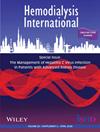Early access flow rate predicts vascular access patency-related intervention in the first year: A retrospective cohort study
Abstract
Introduction
Arteriovenous fistulas and grafts are lifelines for most hemodialysis patients, and a low access flow rate often requires patency-related intervention, such as angioplasty or thrombectomy, to prevent access failure. We examined whether early access flow rate, measured after initial fistula/graft cannulation, predicts vascular access patency-related intervention within 1 year.
Methods
This was a single-center retrospective cohort study. Among 172 patients undergoing surgical creation of a fistula/graft, 52 (30.2%) had documented access flow rates measurement by the Transonic™ ultrasound dilution technique, performed within an average of 48 days from initial access cannulation. The need for a patency-related intervention, defined as undergoing a fistulogram, angioplasty, thrombectomy, or surgical revision, was ascertained within 1 year. A receiver-operating characteristic curve (ROC) was generated to evaluate the diagnostic performance of first and average access flow rates for predicting patency-related intervention within 1 year.
Findings
Twenty-eight (53.8%) of the 52 study subjects required a patency-related intervention within 1 year. Their characteristics were not significantly different from those who did not require patency-related interventions. However, first access flow rates were significantly lower in patients requiring patency-related intervention compared to those who did not (898 vs. 1471 mL/min; p = 0.003), as were average access flow rates (841 vs. 1506 mL/min; p < 0.001). The ROC analyses revealed that first access flow rates and average access flow rates predicted the need for patency-related intervention within 1 year, with an area under-the-ROC curve of 0.743 (95% confidence interval [CI] 0.608, 0.877) and 0.775 (95% CI 0.648, 0.903), respectively, demonstrating acceptable discrimination.
Discussion
In adults undergoing hemodialysis, early access flow rate measurement can predict patency-related intervention within 1 year after initial vascular access cannulation. Additional studies are required to confirm these findings and identify optimal access flow rate cut-off values to predict vascular accesses at higher risk of stenosis.

 求助内容:
求助内容: 应助结果提醒方式:
应助结果提醒方式:


